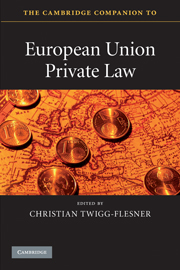Book contents
- Frontmatter
- Contents
- Preface
- List of Contributors
- Table of cases
- Table of legislation
- 1 Introduction
- 2 The historical evolution of European private law
- 3 European private law and the comparative method
- 4 The role of the conflict of laws in European private law
- 5 Competence and European private law
- 6 Language and terminology
- 7 European private law by directives
- 8 The European Court of Justice as a motor of private law
- 9 European contract law
- 10 The way forward in European consumer contract law
- 11 Commercial contracts and European private law
- 12 European tort law
- 13 European Union property law
- 14 Information obligations and withdrawal rights
- 15 Travel law
- 16 Unfair contract terms
- 17 Unfair commercial practices and European private law
- 18 Consumer sales and associated guarantees
- 19 Product liability
- 20 Commercial agency in European Union private law
- 21 EU competition law and European private law
- 22 Non-discrimination and European private law
- 23 Financial services in European Union private law
- Further reading
- Index
13 - European Union property law
Published online by Cambridge University Press: 05 July 2015
- Frontmatter
- Contents
- Preface
- List of Contributors
- Table of cases
- Table of legislation
- 1 Introduction
- 2 The historical evolution of European private law
- 3 European private law and the comparative method
- 4 The role of the conflict of laws in European private law
- 5 Competence and European private law
- 6 Language and terminology
- 7 European private law by directives
- 8 The European Court of Justice as a motor of private law
- 9 European contract law
- 10 The way forward in European consumer contract law
- 11 Commercial contracts and European private law
- 12 European tort law
- 13 European Union property law
- 14 Information obligations and withdrawal rights
- 15 Travel law
- 16 Unfair contract terms
- 17 Unfair commercial practices and European private law
- 18 Consumer sales and associated guarantees
- 19 Product liability
- 20 Commercial agency in European Union private law
- 21 EU competition law and European private law
- 22 Non-discrimination and European private law
- 23 Financial services in European Union private law
- Further reading
- Index
Summary
Introduction
Property law, that is, the law dealing with ‘rights against the world’ with regard to objects in that world, tangible and intangible, is traditionally a very nationally-oriented area of law. Property law, especially the ownership of land, forms the foundation upon which many other areas of law, such as tax law, environmental law and succession law are built. Most of these areas were excluded from the Treaty of Rome 1957. The law of property is, therefore, traditionally conceived as an area in which European law, more specifically, the law of the European Union, has hardly any or no effect. For that reason, property lawyers still generally restrict themselves to studying law as a national discipline and do not take into consideration the already existing and potential effects of European integration.
Property lawyers often feel strengthened in their traditionally national approach by Article 295 EC [Article 345 TFEU]. This states that ‘this Treaty shall in no way prejudice the system of property ownership in the Member States’. However, this Article has not stopped the European legislature, nor the European Court of Justice (ECJ), from acting also in this area of the law. Article 295 [Article 345 TFEU] refers more to what is known as the principle of neutrality in EU competition law. In other words, the Treaty does not apply to the decision of a Member State to hold shares in a company as a form of public ownership or the decision to sell government-held shares to a private party in order to privatise ownership of companies. A good example of this is the recent takeover of privately-held banks by governments as part of a rescue operation to avoid insolvency of these banks. The decision to take over banks is as such a matter for the Member State, unlike giving these banks financial support, which is a matter of EU competition law.
- Type
- Chapter
- Information
- The Cambridge Companion to European Union Private Law , pp. 173 - 186Publisher: Cambridge University PressPrint publication year: 2010
- 4
- Cited by



